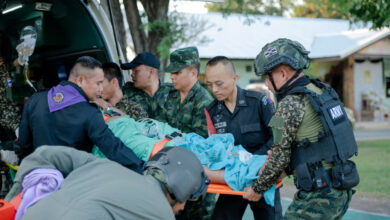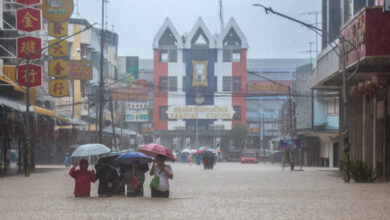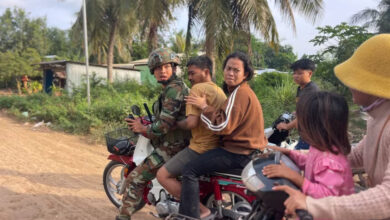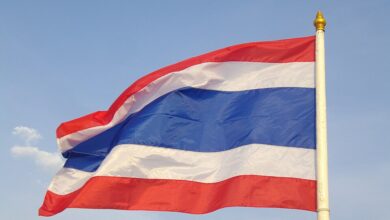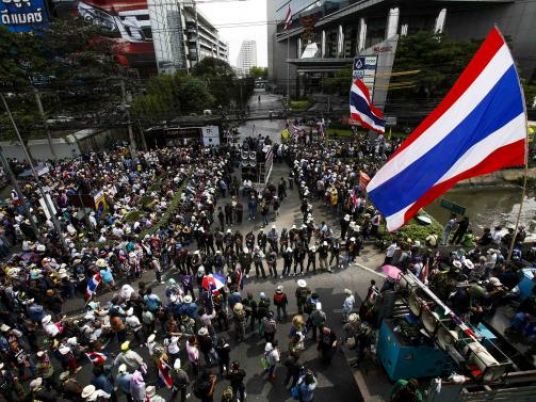
Thailand's military government sent thousands of troops and police into central Bangkok on Sunday to stop any demonstrations against its seizure of power, and some shopping malls and train stations closed to avoid trouble.
Authorities were anticipating that protesters would gather at several spots in the capital including an area in the centre where big malls are located. The military has banned political gatherings of five people or more.
The military took over on May 22 after the government of Prime Minister Yingluck Shinawatra had been weakened by months of protests that had forced ministries to close for weeks on end, hurt business confidence and caused the economy to shrink.
Protests against the coup have taken place in Bangkok most days since then although they have been small and brief.
Deputy police chief Somyot Poompanmoung told Reuters 5,700 police and soldiers were being sent into central Bangkok and rapid deployment units were ready to stop protests that might spring up elsewhere.
Some top-end malls around the Ratchaprasong area have chosen to close or have reduced opening hours, and the operator of the Skytrain overhead rail network has shut several stations in the central area.
"It's a business centre and we need to protectively avoid any damage if authorities need to break up a gathering," Somyot said, adding mall owners could also find themselves in trouble with the authorities if protests took place on their premises.
By midday Ratchaprasong was swarming with police and media but there was barely a protester to be seen.
A lone woman was seen sitting at an intersection wearing a white mask with the word "People" written on it. Within a few minutes she was detained by police.
A group of about 30 people protested inside the Terminal 21 mall in the Asoke area. Most were signalling their opposition to the coup by holding three middle fingers of one hand up in the air, which some said stood for freedom, equality and brotherhood. Police detained one of the protesters.
On Saturday, as on the two previous days, the authorities effectively closed down the normally busy roads around Victory Monument, which was becoming a focal point for opposition to the coup. The area was flooded with police and troops but no protesters turned up.
"RECONCILIATION"
At the heart of nearly a decade of political turmoil in Southeast Asia's second-biggest economy is conflict between the Bangkok-based royalist establishment dominated by the military, old-money families and the bureaucracy, and supporters of former telecommunications mogul Thaksin Shinawatra, who is adored by the poor in the north and northeast. Thaksin, who was ousted as premier in a 2006 coup, is the brother of Yingluck and was considered the real power behind her government. He has chosen to live in exile since fleeing a 2008 conviction for abuse of power.
In a televised address late on Friday, army chief and coup leader General Prayuth Chan-ocha said the military would need time to reconcile Thailand's antagonistic political forces and push through reforms.
He outlined a process beginning with three months of "reconciliation". A temporary constitution would be drawn up and an interim prime minister and cabinet chosen in a second phase, taking about a year, he said. An election would come at an unspecified time after that.
The United States, European Union countries and others have called for a rapid restoration of democracy through elections, the release of political detainees and an end to censorship.
Australia scaled back relations with the Thai military on Saturday and banned coup leaders from travelling there.
Sihasak Phuangketkeow, permanent secretary at Thailand's Foreign Ministry, played down foreign concers and pleaded for understanding from his country's allies.
"The fact is that Thailand is not going to disappear from the map," he told reporters on the sidelines of a regional security forum in Singapore on Sunday, noting his country's economic weight in Southeast Asia.
"And importantly, we have already started a process of heading back on the democratic track," he said. "As things progress, I do hope that our friends and partners will take these developments into consideration."

